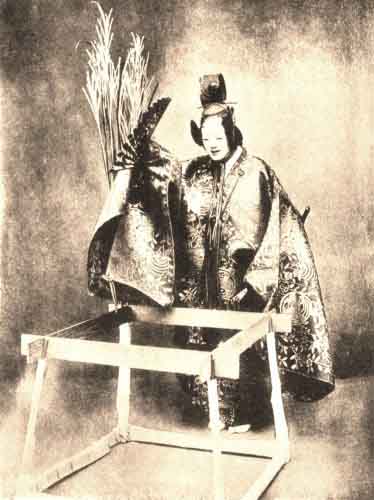
Sacred Texts Shinto Buddhism Index Previous Next


IZUTSU
IZUTSU
KAKITSUBATA
HANAKATAMI
OMINAMESHI
MATSUKAZE
SHUNKWAN
AMA
TAKE NO YUKI
TORI-OI
YUYA
TANGO-MONOGURUI
IKKAKU SENNIN
YAMAUBA
HOTOKE NO HARA
MARI
TŌRU
MAI-GURUMA
SUMMARIES
OF the plays which are founded on the Ise Monogatari 1 the best known are Izutsu and Kakitsubata, both by Seami. Izutsu is founded on the episode which runs as follows:
Once upon a time a boy and a girl, children of country people, used to meet at a well and play there together. When they grew up they became a little shame-faced towards one another, but he could think of no other woman, nor she of any other man. He would not take the wife his parents had found for him, nor she the husband that her parents had found for her.
Then he sent her a poem which said:
"Oh, the well, the well!
I who scarce topped the well-frame
Am grown to manhood since we met."
And she to him:
"The two strands of my hair
That once with yours I measured,
Have passed my shoulder;
Who but you should put them up?" 2
So they wrote, and at last their desire was fulfilled. Now after a year or more had passed the girl's parents died, and they were left without sustenance. They could not go on living together; the man went to and fro between her house and the town of Takayasu in Kawachi, while she stayed at home.
Now when he saw that she let him go gladly and showed no grief in her face, he thought it was because her heart had changed. And one day, instead of going to Kawachi, he hid behind the hedge and watched. Then he heard the girl singing:
"The mountain of Tatsuta that rises
Steep as a wave of the sea when the wind blows
To-night my lord will be crossing all alone!"
And he was moved by her song, and went no more to Takayasu in Kawachi.
In the play a wandering priest meets with a village girl, who turns out to be the ghost of the girl in this story. The text is woven out of the words of the Ise Monogatari.
Kakitsubata is based on the eighth episode. Narihira and his companions come to a place called Yatsuhashi, where, across an iris-covered swamp, zigzags a low footpath of planks.
Narihira bids them compose an anagram on the work Kakitsubata, "iris," and some one sings:
"Kara-goromo
Ki-tsutsu nare-ni-shi
Tsuma shi areba
Baru-baru ki-nuru
Tabi wo shi zo omou."
The first syllables of each line make, when read consecutively, the word Kakitsubata, and the poem, which is a riddle with many meanings, may be translated:
"My lady's love
Sat close upon me like a coat well worn;
And surely now
Her thoughts go after me down this long road!"
"When he had done singing, they all wept over their dried-rice till it grew soppy."
In the play, a priest comes to this place and learns its story from a village-girl, who turns out to be the "soul of the iris-flower." At the end she disappears into the Western Paradise. "Even the souls of flowers can attain to Buddhahood."
219:1 The love-adventures of Narihira (825-880 A.D.) in 125 episodes, supposed to have been written by Narihira himself.
219:2 The husband puts up the bride's hair.